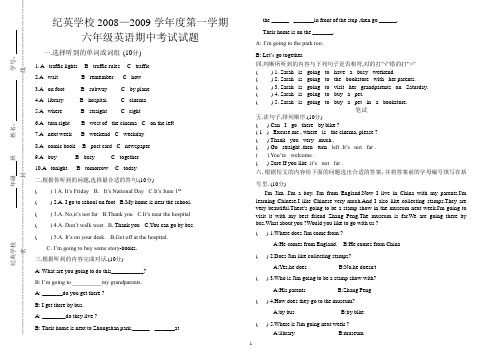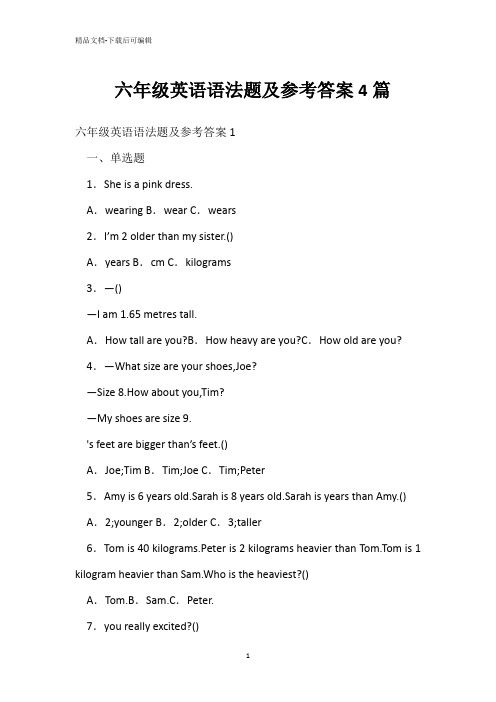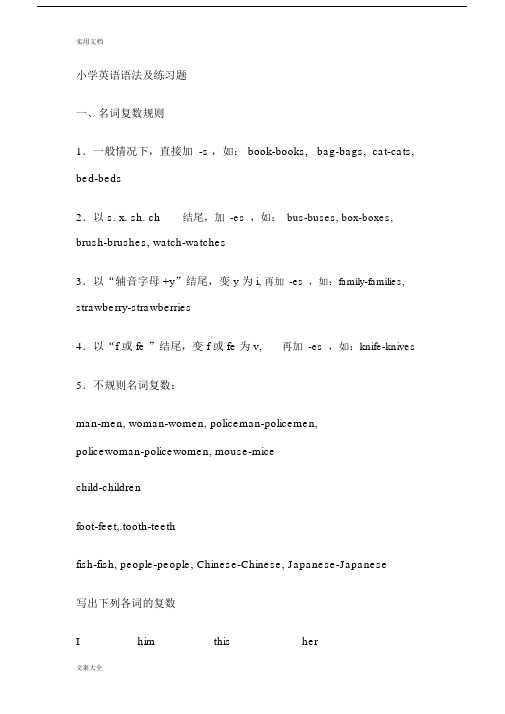2008-2009学年小学六年级英语语法及练习.
小学六年级英语语法讲解及专项练习

小升初英语语法时态讲解与归纳(一)【一般现在时】一. 意义:表示经常发生的事情,动作或存在的状态二. 构成及变化1.be动词的变化。
肯定句:主语+be(am,is,are)+其它。
如:I am a boy。
我是一个男孩。
否定句:主语+ be + not +其它。
如:He is not a worker。
他不是工人。
一般疑问句:Be +主语+其它。
如:-Are you a student? -Yes. I am. / No, I'm not。
特殊疑问句:疑问词+一般疑问句。
如:Where is my bike?2. 行为动词的变化。
当主语为第一,二人称及复数时,助动词为do肯定句:主语+动词原形(+其它)。
如:We often play basketball after school。
否定句:主语+ don't+动词原形(+其它)。
如:we don’t play basketball after school。
一般疑问句:Do +主语+动词原形+其它?如: Do you often play basketball after school l? Yes, we do. / No, we don't。
特殊疑问句:疑问词+以do开头的一般疑问句?如: What do you often do after school ?当主语为第三人称单数时 ,助动词为does肯定句:主语+动词三单式(+其它)。
如: He swims well。
否定句:主语+ doesn’t+动词原形(+其它)。
如:He doesn’t swim well。
.一般疑问句:Does +主语+动词原形+其它。
如:Does he swim well ? Yes, he does. / No, he doesn't。
特殊疑问句:疑问词+以does开头的一般疑问句?如: How does your father go to work?三。
人教版小学六年级总复习英语语法知识最全整理+语法专项训练题

小学英语语法知识最全整理+语法专项训练题一、小学英语语法知识最全整理第一章名词(Noun)名词的概念在生活中,我们会接触到各种各样的人和事物,用来表示这些人或事物名称的词就是名词。
一、名词的数名词的数指名词的单数和复数形式。
可数名词表示“一个”时用单数,“两个以上”时用复数;不可数名词表示量时,通常用“数词+单位+of+物质名词”的形式,如 a piece ofbread (一片面包),变为复数时,只须将单位名词变为复数,如:two pieces of bread(两片面包)。
*名词复数的构成法则1. 一般情况下在词尾加 s. 词尾读音shop --- shops (商店) 在清辅音后读 [ s ]bag --- bags (书包) 在浊辅音后读[ z ]window --- windows (窗户) 在元音后读 [ z ]2. 以 s, x, sh, ch结尾的单词在词尾加es。
class --- classes (班级) 词尾读音[ iz ]box --- boxes (盒子)match --- matches (比赛)brush --- brushes (刷子)3. 以“辅音字母 +y”结尾的词,变y为 i 加es.story --- stories (故事) 词尾读音[ iz ]4. 以“元音字母 +y”结尾的词,在词尾直接加skey --- keys 词尾读音[ z ]monkey --- monkeys5.以“o”结尾的名词,复数一般在词尾加“s”,但个别加“es”tomato --- tomatoes (西红柿) 词尾读音[ z ]potato --- potatoes (土豆)zoo --- zoos (动物园)photo --- photos (照片)*(以“o”结尾,复数加“es”)口诀:黑人(Negro)英雄(hero),左手拿着西红柿(tomato),右手拿着破土豆(potato),头顶一个大芒果(mango)。
2008—2009学年度第一学期 六年级英语期中考试试题

纪英学校2008—2009学年度第一学期六年级英语期中考试试题一.选择听到的单词或词组 (10分)1. A traffic lights B traffic rules C traffic2.A wait B remember C how3.A on foot B subway C by plane4.A library B hospital C cinema5.A where B straight C right6.A turn right B west of the cinema C on the left7.A next week B weekend C weekday8.A comic book B post card C newspaper9.A buy B busy C together 10.A tonight B tomorrow C today 二.根据你听到的问题,选择最合适的答句.(10分)( ) 1 A. It’s Friday B. It’s National Day C.It’s June 1st ( ) 2.A. I go to school on foot B.My home is near the school. ( ) 3.A. No,it’s not far B.Thank you C.It’s near the hospital ( ) 4.A. Don’t walk west . B . Thank you C.You can go by bus ( ) 5.A. It’s on your desk. B.Get off at the hospital. C. I’m going to buy some story -books. 三.根据听到的内容完成对话.(10分) A: What are you going to do this___________? B: I’m going to __________my grandparents. A: _______do you get there ? B: I get there by bus. A: ________do they live ?B: Their home is next to Zhongshan park.______ _______atthe ______ _______in front of the stop ,then go ______. Their home is on the _______. A: I’m going to the park too. B: Let ’s go together.四.判断所听到的内容与下列句子是否相符,对的打”√”错的打”×” ( ) 1. Sarah is going to have a busy weekend.( ) 2. Sarah is going to the bookstore with her parents.( ) 3. Sarah is going to visit her grandparents on Saturday. ( ) 4. Sarah is going to buy a pet.( ) 5. Sarah is going to buy a pet in a bookstore.笔试五.读句子,排列顺序.(10分)( ) Can I go there by bike ?( 1 ) Excuse me , where is the cinema, please ? ( ) Thank you very much .( ) Go straight ,then turn left .It’s not far . ( ) You’re welcome .( ) Sure If you like .it’s not far .六.根据短文的内容给下面的问题选出合适的答案,并将答案前的字母编号填写在括号里.(10分)I'm Jim .I'm a boy. I'm from England.Now I live in China with my parents.I'm learning Chinese.I like Chinese very much.And I also like collecting stamps.They are very beautiful.There's going to be a stamp show in the museum next week.I'm going to visit it with my best friend Zhang Peng.The museum is far.We are going there by bus.What about you ?Would you like to go with us ? ( ) 1.Where does Jim come from ?A:He comes from England. B:He comes from China ( ) 2.Does Jim like collecting stamps?A:Yes,he does B:No,he doesn't ( ) 3.Who is Jim going to be a stamp show with? A:His parents B:Zhang Peng ( ) 4.How does they go to the museum? A:by bus B:by bike ( ) 5.Where is Jim going next week ? A:library B:museum纪英学校 年级 班 姓名: 学号:……………………………………密………………………………封……………………………………………线……………………………七.单项选择. (10分)( ) 1. Let’s _____ to the park.A. goB. goingC. goes( ) 2. He goes to school _____,because his home is far from the school.A. on footB. by busC. by bike( ) 3. -----______,where is the hospital ?----_______.I don’t know.Sorry ; Sorry. B. Sorry ;Excuse me. C. Excuse me; Sorry( ) 4. What ____Amy going to do this evening ?A. doesB. isC. doing( ) 5. ----Where is the hospital ?-----It's ____ the cinema.A. nextB. near toC. next to八.按要求完成习题.(10分)1.left (反义词)____ ____2.read a magazine (英译汉)______________3.traffic rules (英译汉)______________4.go straight (英译汉)_____________5.去看电影(汉译英)___________________6.交通灯(汉译英)_______________7.buy (同音词)_____________8.打扫你的房间(汉译英)_______ ____ __________9.忙碌的周末(汉译英)_______________________ 10.foot(复数形式)_________九.连词成句.(10分)1. off at the please Get cinema (. )________________________________________________________________________ 2. next Where week are going you (?)________________________________________________________________________ 3. to go How Canada you do (?)________________________________________________________________________ 4. How I get the hospital can to (?)________________________________________________________________________ 5. you What are to on going weekend do the (?)________________________________________________________________________ 十.作文.(10分) 假如你是Sarah,根据下面表格提供的内容写一篇短文,(不少于5句)。
六年级英语语法题及参考答案4篇

六年级英语语法题及参考答案4篇六年级英语语法题及参考答案1一、单选题1.She is a pink dress.A.wearing B.wear C.wears2.I’m 2 older than my sister.()A.years B.cm C.kilograms3.—()—I am 1.65 metres tall.A.How tall are you?B.How heavy are you?C.How old are you? 4.—What size are your shoes,Joe?—Size 8.How about you,Tim?—My shoes are size 9.'s feet are bigger than’s feet.()A.Joe;Tim B.Tim;Joe C.Tim;Peter5.Amy is 6 years old.Sarah is 8 years old.Sarah is years than Amy.() A.2;younger B.2;older C.3;taller6.Tom is 40 kilograms.Peter is 2 kilograms heavier than Tom.Tom is 1 kilogram heavier than Sam.Who is the heaviest?()A.Tom.B.Sam.C.Peter.7.you really excited?()A.Do B.Are C.Will8.Keep on Chinese in the UK.()A.practise B.practising C.to practise9.I’m going to study History my new friends.()A.in B.with C.to10.—Are you going to middle school this September?() —Yes,I’m excited.A.read B.real C.really11.We’ll always be.()A.friend B.friends C.the friend12.—I’m going to study English.()—?A.What you B.How are you C.What about you 13.Now I can write English.()A.in B.on C.with14.It’s time go bed.()A.to;to B.for;to C.to;for15.I’m going to my bike to school.()A.by B.on C.ride16.Can we always friends?()。
(完整)小学英语六年级总复习语法及练习题(一).docx

小学英语语法及练习题一、名词复数规则1.一般情况下,直接加 -s ,如: book-books, bag-bags, cat-cats, bed-beds2.以 s. x. sh. ch结尾,加-es,如:bus-buses, box-boxes, brush-brushes, watch-watches3.以“辅音字母 +y”结尾,变 y 为 i,再加-es,如:family-families, strawberry-strawberries4.以“f 或 fe ”结尾,变 f 或 fe 为 v,再加-es,如:knife-knives 5.不规则名词复数:man-men, woman-women, policeman-policemen,policewoman-policewomen, mouse-micechild-childrenfoot-feet,.tooth-teethfish-fish, people-people, Chinese-Chinese, Japanese-Japanese写出下列各词的复数I _________him _________this ___________her ______watch _______child _______photo ________diary ______day________ foot________ book_______ dress ________tooth_______ sheep ______box_______ strawberry _____thief _______yo-yo ______ peach______ sandwich ______man______ woman_______ paper_______juice___________ water________ milk________ rice__________ tea__________二、一般现在时一般现在时基本用法介绍【No. 1 】一般现在时的功能1. 表示事物或人物的特征、状态。
08—2009学年第二学期六年级期末英语试卷

()1、The green toothbrush is.
A、meB、myC、mineD、I
()2、Stevenwears dresses .
A、sometimesB、usually C、never D、always
()3、Whatyou like for breakfast .
A、wouldB、couldC、mayD、are
()4、is it ?
A、AreB、WhyC、What timeD、Do
()5、There are manyin the classroom .
A、child B、children C、childs D、childes
()6、We make snowballs(雪球)inin China .
The Greens like China. They have many Chinese friends.
根据短文,判断正(√)误(×)。
( ) 1.The Greens are in China now.
( ) 2.Mr.Green and his wife are English teachers.
新坝学区2008—2009学年第二学期六年级期末英语试卷
出卷人:朱华明
一、根据汉语意思,选择适当的字母或字母组合完成单词,并将序号填到前面的括号里。(10分)
()1、flg ( ) A . a B .e C .i D . o
()2、pty ( ) A .ar B .ir C .el D.ur
()3、lt( ) A .a,r B.c,e C.I,e D. a,e
7、boy(对应称呼词)8、buy(过去式)
9、teach(过去式)10、our(同音词)
2008---2009学年度小学六年级毕业试题(冀教版)

2008—2009学年度第二学期期末质量检测六年级英语试题一、指出每组单词中与其他三个不是同一类的单词,并把它的编号写在相应的括号内(15分)( ) 1. A.healthy B.face C. foot D. arm( ) 2. A . pear B. flower C. apple D. banana( ) 3. A. bread B. milk C. table D. egg( ) 4. A. one B. two C. first D. four( ) 5. A. spring B. summer C. winter D.happy二、读句子,选正确图片(15分)( )1. 1.Today is my birthday! —— Happy birthday to you!( )2. She gives Li Ming the gift. —— Thank you!( )3. .What did you do? —— I went to the zoo.( )4. What season is it? —— It is summer.( ) 5. What do you wear to go swimming? —— A swimsuit三、单项选择(26分)( )1. —What’s ___ name? —____ name is Danny.A. My; IB. your; MyC. your; I( )2 . —How___ you? —I’m fine.A. amB. areC. beA B C DA B C DA B C DA B CDA B CD( )3. Thank ___ very much. A. your B. you’re C. you( )4. —Thanks a lot. —___________.A. Yes, pleaseB. No, thank youC. You’re welcome( )5. —Do you like salt , too? —______________.A. Yes, I doB. This is saltC. Yes, I am( )6. —___for one hot dog? —Five yuan.A. How muchB. How manyC. What( )7. Do you have any ___? A. apple B. an apple C. apples( )8.I ___ a student. A. is B. am C. be( )9.It is cold outside. Put __ your coat.A. onB. inC. at( )10.—May I ask you some questions? —______________.A. Yes, I canB. CertainlyC. You’re welcome( ) 11.Do you have ___________ping-pong balls? A. a B. any C. some ( ) 12. How many _____do you need? A gift B gifts C. giftes( ) 13._____will you go to school tomorrow? A What B. When C. How四、短语大练兵(14分)( )1.a pair of runners A. 洗脸( )2.at school B. 一双跑鞋( )3.say hello to C. 在飞机场( )4.go swimming D. 从星期一到星期五( )5.from Monday to Friday E. 在学校( )6.wash your face F. 去游泳( )7.at the airport G.. 向……问好五、句型转换(10分)1. I walk to school once a week. (对画线部分提问). _______ _____ do you walk to school?2. You can answer my question. (变为一般疑问句) ________ ________ answer my question?3. It was a good team. (变为否定句) It _______ ________ a good team.4. snacks, you, did , what , buy (连词成句) ___________________________________5. This flower is weak. (变为同义句) ____________________________________六、情景会话(从右边的方框中选出正确选项,将序号填在横线上,10分)A. What a hot ,sunny day!A.Let’s go swimming in the river.B.That’s great.It is bright outside.A. Thanks. ,orange or water?B. Water, please.A.Ok.B.Thank you.A.七、阅读理解(10分)I get up at 6:50 every morning. Then I put on my clothes and shoes. And I eat my breakfast at 7:20. I eat milk, apple and bread for my breakfast. At 7:30 I go to school by bus. I arrive at school at 8:00. Then I have my lesson at 8:20. I go home at 5:30 pm after school.( )1.I ___ at 6:50 every morning. A. get work B. get up C. wake up ( )2. My breakfast is at ________. A.7: 20 B. 7:30 C. 7:00 ( )3.I go to school____. A. by bike B. by train C. by bus( )4.I___ school at 8:00. A. arrive at B. arrive in C. arrive( )5. I___ at 5:30 pm. A. go home B. play C. sleep2008—2009学年度第二学期期末质量检测英语参考答案一、指出每组单词中与其他三个不是同一类的单词,并把它的编号写在相应的括号内(15分)1-5 A BCCD二、读句子,选正确图片(15分)1-5 ABCDB三、单项选择(26分)1-5 BBCCA 6-10ACBAB 11-13 BBC四、短语大练兵(14分)( B )1.a pair of runners A.洗脸( E )2.at school B.一双跑鞋( G )3.say hello to C.在飞机场( F )4.go swimming D.从星期一到星期五( D )5.from Monday to Friday E.在学校( A )6.wash your face F.去游泳( C )7.at the airport G..向....问好五、句型转换(10分)略六、情景会话(从右边的方框中选出正确选项,将序号填在横线上,10分)C D E A B七、阅读理解(10分)1-5 B A C A A。
2008-2009六下英语综合卷(一)

2008—2009学年度第二学期小学英语六年级综合卷(一)听力部分一、Listen and choose (听录音, 选出跟录音相符合的一项,并将其字母编号填在题前的括号里 )(每小题1分,共10分) ( )1. A. fly B. blue C. fruit ( )2. A. think B. thin C. sick ( )3. A. weather B. water C. winter ( )4. A. went B. when C. where ( ) 5.A. short B. shirt C. skirt ( )6. A. plate B. plane C. play ( )7.A. take a trip B. take a train C. take pictures ( )8.A. did homework B did housework C. did the work ( )9. A. What did you do yesterday? B. What did he do last Monday? C. What did she do last Sunday?. ( )10. A. What day is it today? B.What day was it yesterday? C. What ’s the date? 二、Listen and judge 听录音, 判断图片或句子的是否与录音内容相符, 相符的在相应题下的括号内打“√” , 不相符的打“×”(每小题1分,共10分) 1.( ) 2.( ) 3.( ) 4.( ) 5.( ) ( ) 6. There is a big table and a small closet in the room. ( ) 7. I ’d like some fruit. ( ) 8.My birthday is on Children ’s Day. ( ) 9. I ’m 3 cm taller than you. ( ) 10.I usually do the dishes on the weekend.三、Listen and fill (根据录音内容填写下列句子中所缺的单词, 使句子完整,每空只填一词,每词1分,共5分)1、What ’s your father? He is an ______. He likes ______________.学校 班级 座号 姓名2、There are____ boys and_____ girls in our class.3、 What ________is your shirt? It’s red.四、Listen and answer( 根据你在录音中的问题,将下面每组答句中最合适的答案选出来,并将其前面的字母符号填在句子前面的括号里,共10分)( ) 1、A. She’s my friend. B. She’s very smart.C. She’s a teacher.( ) 2、A. I’m 35 kg. B. I’m 12. C. I’m 150 cm.( ) 3、A. I did my homework. B .I can cook meals. C. I’m doing sports. ( ) 4、A. I went to Beijing. B. I went there last year.C. I went there by train.( ) 5、A. It’s next to the window. B. It’s east of the park.C. It’s in front of the room.五、Listen and judge(根据你在录音中听到的内容判断句子的对错,相符的在相应题号下的括号内打“√” , 不相符的打“×”,每小题2分,共10分)( ) 1. Wang Dong lives in the village.( ) 2. Wang Dong went to Guangzhou by bus yesterday.( ) 3. Wang Dong and his cousin went to Zhongshan Park.( ) 4. Wang Dong and his cousin bought some books in Guangzhou.( ) 5. Wang Dong had a good time last Sunday.笔试部分六、Read the conversation and choose the answers补全对话。
- 1、下载文档前请自行甄别文档内容的完整性,平台不提供额外的编辑、内容补充、找答案等附加服务。
- 2、"仅部分预览"的文档,不可在线预览部分如存在完整性等问题,可反馈申请退款(可完整预览的文档不适用该条件!)。
- 3、如文档侵犯您的权益,请联系客服反馈,我们会尽快为您处理(人工客服工作时间:9:00-18:30)。
小学六年级英语语法及练习一、名词复数规则1.一般情况下,直接加-s,如:book-books, bag-bags, cat-cats, bed-beds2.以s. x. sh. ch结尾,加-es,如:bus-buses, box-boxes, brush-brushes, watch-watches 3.以“辅音字母+y”结尾,变y为i, 再加-es,如:family-families, strawberry-strawberries 4.以“f或fe”结尾,变f或fe为v, 再加-es,如:knife-knives,wolf-wolves,leaf-leaves 5.以o结尾,有生命的加-es,如:Negroes,heroes,tomatoes,potatoes6.不规则名词复数:man-men woman-women policeman-policemen policewoman-policewomenmouse-mice child-children foot-feet tooth-teethfish-fish people-people Chinese-Chinese Japanese-Japanese写出下列各词的复数I _________him _________this ___________her ______watch _______child _______photo ________diary ______day________ foot________ book_______ dress ________tooth_______ sheep ______box_______ strawberry _____thief _______yo-yo ______ peach______ sandwich ______man______ woman_______ paper_______ juice___________water________ milk________ rice__________ tea__________二、一般现在时一般现在时基本用法介绍【No. 1】一般现在时的功能1.表示事物或人物的特征、状态。
如:The sky is blue.天空是蓝色的。
2.表示经常性或习惯性的动作。
如:I get up at six every day.我每天六点起床。
3.表示客观现实。
如:The earth goes around the sun.地球绕着太阳转。
一般现在时的构成1. be动词:主语+be(am,is,are)+其它。
如:I am a boy.我是一个男孩。
2.行为动词:主语+行为动词(+其它)。
如:We study English.我们学习英语。
当主语为第三人称单数(he, she,it)时,要在动词后加"-s"或"-es"。
如:Mary likes Chinese.玛丽喜欢汉语。
一般现在时的变化1. be动词的变化。
否定句:主语+ be + not +其它。
如:He is not a worker.他不是工人。
一般疑问句:Be +主语+其它。
如:-Are you a student?-Yes. I am. / No, I'm not.特殊疑问句:疑问词+一般疑问句。
如:Where is my bike?2.行为动词的变化。
否定句:主语+ don't( doesn't ) +动词原形(+其它)。
如:I don't like bread.当主语为第三人称单数时,要用doesn't构成否定句。
如:He doesn't often play.一般疑问句:Do( Does ) +主语+动词原形+其它。
如:- Do you often play football?- Yes, I do. / No, I don't.当主语为第三人称单数时,要用does构成一般疑问句。
如:- Does she go to work by bike?- Yes, she does. / No, she doesn't.特殊疑问句:疑问词+一般疑问句。
如:How does your father go to work?动词+s的变化规则1.一般情况下,直接加-s,如:cook-cooks, milk-milks2.以s. x. sh. ch. o结尾,加-es,如:guess-guesses, wash-washes, watch-watches, go-goes 3.以“辅音字母+y”结尾,变y为i, 再加-es,如:study-studies一般现在时用法专练:一、写出下列动词的第三人称单数drink ________ go _______ stay ________ make ________look _________ have_______ pass_______ carry ____come________ watch______ plant_______ fly ________study_______ brush________ do_________ teach_______二、用括号内动词的适当形式填空。
1. He often ________(have) dinner at home.2. Daniel and Tommy _______(be) in Class One.3. We _______(not watch) TV on Monday.4. Nick _______(not go) to the zoo on Sunday.5. ______ they ________(like) the World Cup?6. What _______they often _______(do) on Saturdays?7. _______ your parents _______(read) newspapers every day?8. The girl _______(teach) us English on Sundays.9. She and I ________(take) a walk together every evening.10. There ________(be) some water in the bottle.11. Mike _______(like) cooking.12. They _______(have) the same hobby.13. My aunt _______(look) after her baby carefully.14. You always _______(do) your homework well.15. I _______(be) ill. I’m staying in bed.16. She _______(go) to school from Monday to Friday.17. Liu Tao _______(do) not like PE.18. The child often _______(watch) TV in the evening.19. Su Hai and Su Yang _______(have) eight lessons this term.20. -What day _______(be) it today?三、现在进行时1.现在进行时表示现在正在进行或发生的动作,也可表示当前一段时间内的活动或现阶段正在进行的动作。
2.现在进行时的肯定句基本结构为be+动词ing.3.现在进行时的否定句在be后加not。
4.现在进行时的一般疑问句把be动词调到句首。
5.现在进行时的特殊疑问的基本结构为:疑问词不达意+ be + 主语+ 动词ing?但疑问词当主语时其结构为:疑问词不达意+ be + 动词ing?动词加ing的变化规则1.一般情况下,直接加ing,如:cook-cooking2.以不发音的e结尾,去e加ing,如:make-making, taste-tasting3.如果末尾是一个元音字母和一个辅音字母,双写末尾的辅音字母,再加ing,如:run-running, stop-stopping现在进行时专项练习:一、写出下列动词的现在分词:play________ run__________ swim _________make__________go_________ like________ write________ _ski___________read________ have_________ sing ________ dance_________put_________ see________ buy _________ love____________live_______ take_________ come ________ get_________stop_________ sit ________ begin________ shop___________二、用所给的动词的正确形式填空:1.The boy __________________ ( draw)a picture now.2. Listen .Some girls _______________ ( sing)in the classroom .3. My mother _________________ ( cook )some nice food now.4. What _____ you ______ ( do ) now?5. Look . They _______________( have) an English lesson .6.They ____________(not ,water) the flowers now.7.Look! the girls ________________(dance )in the classroom .8.What is our granddaughter doing? She _________(listen ) to music.9. It’s 5 o’clock now. We _____________(have)supper now10.______Helen____________(wash )clothes? Yes ,she is .、将来时理论及练习一、概念:表示将要发生的动作或存在的状态及打算、计划或准备做某事。
